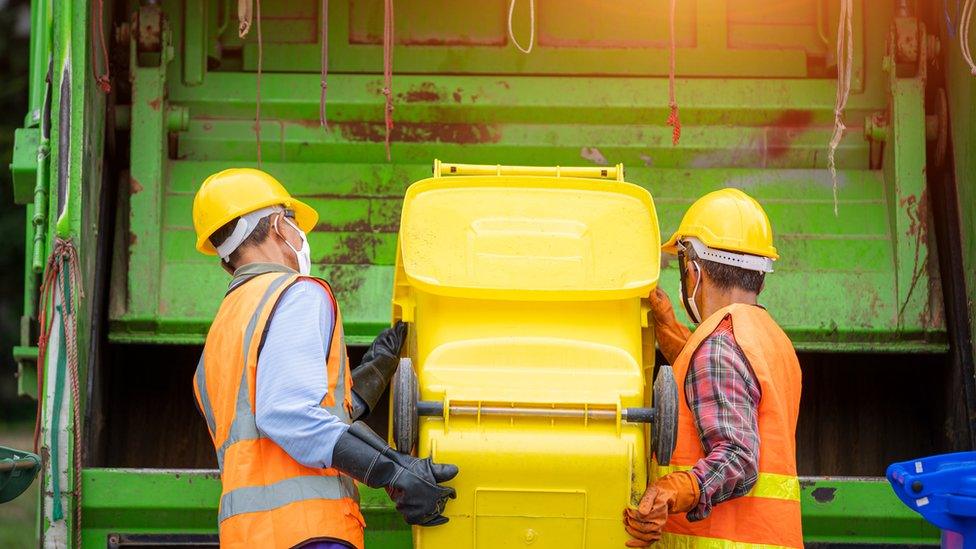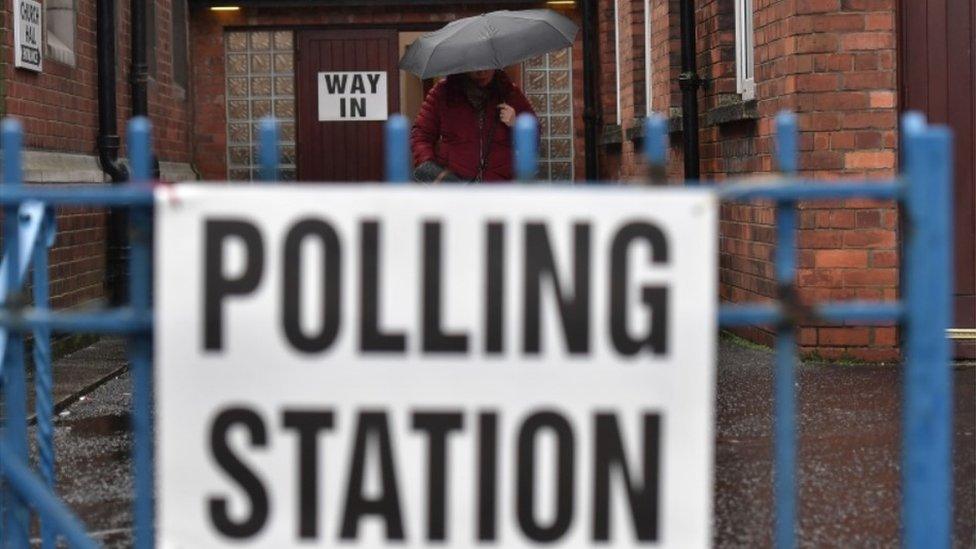Northern Ireland elections 2023: What do councils actually do?
- Published

Recycling and waste collection is one of the areas Northern Ireland's councils are responsible for
Bins, bills and burying the dead - not so long ago this was a jibe directed at councils in Northern Ireland which had very few responsibilities compared to their counterparts in Great Britain.
That all changed when local government was reorganised in 2015, with 11 new councils replacing the previous 26.
Northern Ireland's councils still have fewer powers than their counterparts on the other side of the Irish Sea, but a number of significant areas fall under their control.
When voters go the polls on Thursday, they will be electing 462 councillors who will have a say over issues including leisure services, local planning and arts, heritage and cultural facilities.
And the bills still remain - councils set rates paid by every household.
The full list of council responsibilities are:
Local planning
Waste collection and disposal
Street cleaning
Parks and leisure
Cemeteries
Economic development
Off-street parking
Arts, heritage and cultural facilities
Registration of births, deaths and marriages
Dog control, entertainment licensing, litter enforcement and food safety all come under wider categories.
Northern Ireland's councils are not responsible for social housing, trading standards, social services, transport, education or even street lighting.
These powers are held by Stormont departments.
Planning power
The most significant of the powers gained by councils back in 2015 was planning.
Under the previous 26-council system, applications to build a new house or erect an extension went through Stormont's environment department.
But now councils have the authority to accept or reject the majority of proposed developments in their own areas.
Karen Smyth of the Northern Ireland Local Government Association (Nilga) said councils were all actively working to publish local development plans, which will inform how local development takes place in future.
"Councils were also given leadership of a completely new function - community planning - which draws together council, statutory, government and community partners to work to improve the social, economic and environmental wellbeing of the local area," she said.
Full council meetings are usually held once a month, with work on quasi-judicial areas such as licensing or planning mostly being delegated to committees.
What are the 11 councils in Northern Ireland?

Northern Ireland is divided up into 11 council areas
How much are councillors paid?
Being a councillor is not intended to be a full-time job, but councillors are entitled to an annual allowance.
This stands at £16,394, up from a previous allowance £15,071 - although some councils have opted to remain at the lower rate.
Civic dignitaries and councillors with extra responsibilities may be paid an additional allowance.
For example, the lord mayor of Belfast, which is a full-time position, has an extra allowance of £34,800 for their year in office.
How are councils funded?
Funding for the councils' activities comes from a number of sources, with rates being the best known.
In February, all of Northern Ireland's councils agreed rates increases to cover increasing running costs.
They cited the continuing effect of the coronavirus pandemic as well as rising energy prices as factors behind the decision.
The biggest annual increase of 7.99% was in Belfast, where the council had never before increased rates by more than 3%.
You can find out how much your council increased rates here.
Rates are a property tax used to pay for both local and regional services.
They are paid by both homeowners and businesses, based on the capital value of their property.
Councils also receive funds in the form of grants from the Department for Communities, fees for certain services and loans.
Could councils get more powers?
Nilga, which represents the interests of all 11 councils, has called for greater powers for its members.
It has pointed out that councils were responsible for less than 5% of public spending in Northern Ireland in 2021-22, compared with about 20% in England, and 24% in Scotland and Wales.
One of the latest developments on the Northern Ireland local authority scene is the establishment of city growth deals, with the Belfast region city deal, the Mid South West "economic engine" and the Derry and Strabane city deal rapidly taking shape.
More than 30 local authorities across Britain already benefit from city deals, which are designed to give them more spending and decision-making powers.
Related topics
- Published17 May 2023

- Published27 April 2023
